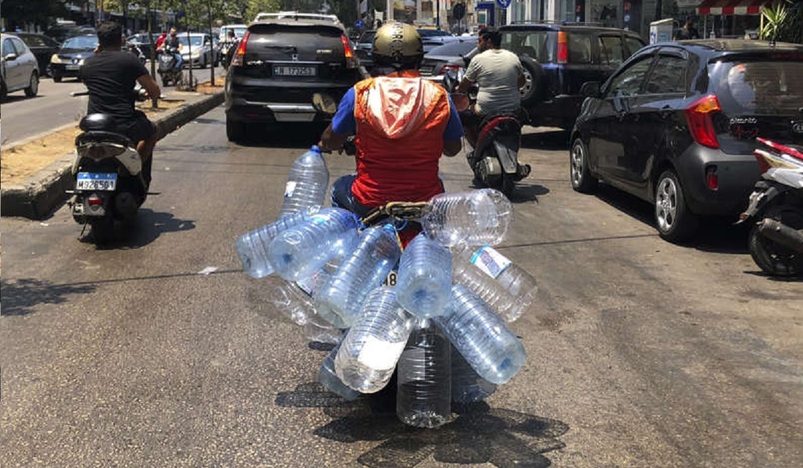
A scooter rider carries empty water bottles to fill with petrol in Beirut. Lebanon's fuel crisis has now led to a shortage of tap water.
The taps in Marwan Kassar's flat in Beirut run dry, sometimes for as long as a day at a time.
Basic state services such as water and electricity have long been lacking in Lebanon, but the Kassar family home in a leafy neighbourhood of the capital used to be relatively well supplied until a few months ago.
“You can’t wash the vegetables, you can’t flush the toilet, you can’t shower, you can’t wash your hands,” Mr Kassar, 23, told The National.
“It’s a very big inconvenience. It’s probably never been this bad in terms of overall living conditions.”
The water problem is the latest manifestation of Lebanon's two-year old economic crisis and is linked to the crippling fuel shortages created by a lack of foreign currency to pay for imports.
Lebanese are hopeful that the announcement of a new Cabinet on Friday – ending 13 months of a caretaker government and impasse – may improve conditions.
But in the meantime, without fuel oil for power plants or diesel for private generators, there is no electricity to pump water or run treatment plants.
The water supply in the densely populated Beirut and Mount Lebanon areas has dropped by about 40 per cent, said Jean Gebran, head of the local state-run water authority.
Some towns in the mountains north of Beirut receive only a few hours of water every two days.
Challenges are adding up. It will be disastrous if the crisis continues
Wassim Daher, South Lebanon Water Establishment
“We have been severely rationing water for the past two to three weeks,” Mr Gebran told The National.
For many people, the solution is to buy water from private suppliers, but prices are soaring and are often unaffordable for impoverished locals.
UN children's agency Unicef estimates that 2.4 million people – a little under half the population – are experiencing water shortages.
Unicef supports Lebanon’s four water production plants by repairing boreholes, replacing and repairing pumps and procuring fuel and chlorine.
A Syrian mother collects water for cooking
Buying maintenance items often requires payment in cash dollars that public institutions cannot access due to the economic crisis.
Funding for an EU-backed project to support water production plants ran out last June, but Unicef requested an emergency loan of $1 million until further funds are received.
“We’re only buying time for decision makers to find a long-term solution,” said Unicef deputy head for Lebanon Ettie Higgins.
The key issue is to restore the supply of electricity to run the water system.
“The issue of water and energy are highly interlinked. We need to solve the energy problem to not suffer from further water problems,” said Nadim Farajalla, director of the climate change and environment programme at the Issam Fares Institute at the American University of Beirut.
A crowded petrol station on the main road that links Beirut to south Lebanon.
Although widely used, electricity from private generators is much less cost-efficient than using state electricity, said Wassim Daher, head of water utility company the South Lebanon Water Establishment.
“We can pump up to 450 metres deep with government electricity – after that we start losing money,” he told The National.
“But if we are working on generators, that happens when we exceed 100 metres.”
Currently, the state provides the region’s pumping stations with only five or six hours of electricity a day, said Mr Daher.
Sometimes, there are 24-hour blackouts.
Most locals are prepared and have tanks on their roofs that store enough water for several days, but Mr Daher worries about how people will cope if water shortages persist.
“Challenges are adding up. It will be disastrous if the crisis continues,” he said.
“Our concern is that we reach a place where there will be an impact on the health of the population.”
No institution is immune from water cuts, and that includes hospitals, prisons, orphanages and schools, Mr Daher said.
“It’s not like electricity where you can just add a [power] line. We cannot send part of a water pipe to a hospital.”
Unicef echoed his concerns. “The cost of inaction will also impact hospitals, schools, and public healthcare centres. If they don’t have running water, disease outbreaks will increase in healthcare facilities,” it said in a July report on Lebanon’s water supply system.
Lack of access to safe water heightens the risk of outbreaks of waterborne disease, including acute watery diarrhoea and diseases long eradicated in Lebanon, such as cholera.
Diarrhoeal disease, often caused by bacteria ingested through contaminated food or water, is the second leading cause of death in children under 5, said the World Health Organisation.
Tap water is not commonly used for drinking in Lebanon because it is deemed unsafe, but if contaminated it might also affect health when used for cooking or bathing and may additionally contaminate reservoirs.
Local authorities have no control on the quality of water sold by private companies.
“Its quality is questionable,” said Mr Farajalla. “It may not be well treated and contain faecal coliform [bacteria] or pathogens that could affect people’s health.”
But quality is rarely the priority when water becomes scarce.
“I should be concerned about the source of the water because it’s probably not the cleanest,” Mr Kassar said, as he paid a private company to fill up his building’s tank.
“But at the end of the day, if you’ve got no solution, all you want is a temporary fix.”
Source: The National
.jpg)
Qatar Secures Place Among the World's Top 10 Wealthiest Nations
.jpg)
Hamad International Airport Witnesses Record Increase in Passenger Traffic

Saudi Arabia: Any visa holder can now perform Umrah

What are Qatar's Labour Laws on Annual Leave?
Leave a comment